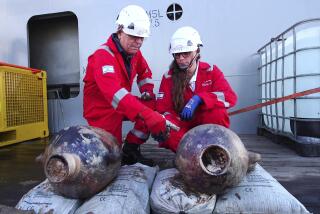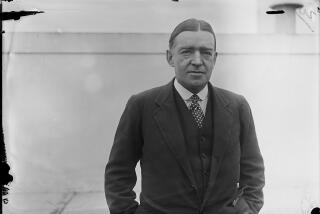Edward Wright; Found Ancient Boats
- Share via
LONDON — Edward Wright, amateur archeologist who discovered Europe’s oldest cargo boats in the banks of an English river, has died at age 83.
Wright, who lived in Amberley in southwest England, died May 18 in a hospital of complications after treatment for prostate cancer, according to the Ferriby Historical Trust.
Wright and his brother, Claude, discovered the first of three boats in 1937 while walking along the shore of Humber estuary in northeast England during a break from university classes.
They found planks sticking out of the mud at North Ferriby, near Hull, and recognized them as parts of a boat made by sophisticated craftsmen.
In 1940, during a break in military service, Edward Wright found a second boat near the same spot, planks of which were taken to the National Maritime Museum in Greenwich, England, for study. Radiocarbon dating methods had not been developed, so their age could not be determined. Preservation methods made it impossible to use carbon dating in later years.
It was the third boat, found by Wright and his son Roderick in 1963, that finally was confirmed as dating from about 2000 to 1900 BC.
The boat was 50 feet long and made of thick oak planks sewn together with twisted yew branches. It was capable of carrying heavy cargo with space for 18 paddlers and possibly a mast.
In March, carbon dating resolved the long-standing controversy and bore out Wright’s theory of the age of the craft.
“It’s pretty exciting at the age of 82 to find out that you made one of the most significant discoveries in British archeology,” he said two months ago.
The government’s English Heritage organization, which funded some of the scientific research into the boats, said the discovery suggested cross-channel trade with the European continent was underway by the second millennium BC.
Intrigued with boats and archeology from boyhood, Wright successfully argued as a tank commander during World War II that training be stopped at Sutton Hoo so as not to damage the ancient Anglo Saxon burial mound. The site has yielded numerous treasures now housed in the British Museum.
In 1946, Wright dug his earliest two Ferriby boats out of the mud, describing the task as “like getting slices of crumbly cheese out of glue.”
Wright wrote a book in 1990 about his claims of the age of his discoveries, “The Ferriby Boats: Seacraft of the Bronze Age.”
He also wrote a history of his pharmaceuticals company, Reckitt and Coleman, and was working on a history of his regiment at the time of his death.
Made a Member of the British Empire, he was a Fellow of the Royal Society of Antiquaries, and in 1967 he and his brother received honorary doctorates from the University of Hull.
A widower, Wright is survived by five children and one brother.
More to Read
Sign up for Essential California
The most important California stories and recommendations in your inbox every morning.
You may occasionally receive promotional content from the Los Angeles Times.













